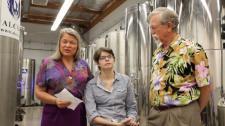Cryonics Taken Apart

Corey Pein has written another excellent piece in The Baffler, this time focusing mainly on Alcor, the cryonics company he describes as "technophilic necromancers." His starting point is actually a very unfortunate New York Times article.
Pein's "Everybody Freeze" begins:
Narratives are made by the artful omission of facts. Never was this maxim more evident than in a gullible feature story that landed on the front page of the New York Times last fall, about a young woman's last-ditch bid for life extension as she succumbed to the ravages of brain cancer. A sober look at the case would have revealed it to be but the latest botched mortuary procedure conducted by a gang of creepy scam artists. Instead, through the good graces of the Times, this grim tale was spun into an inspirational saga of one person's courageous quest for a second chance at life, aided by medical visionaries on the verge of miraculous technological breakthroughs.
(Incidentally, the Times also gave Alcor publicity back in 2005, though in a less hagiographic article.)
Pein details the gruesome facts of the case, with splendidly straight-faced humor: "a crack team of quacks shaved her head and drilled a number of sizable holes into her skull." He then delves deep into the history of Alcor and indeed the origins of modern transhumanism.
Of particular interest to those of us who have been following transhumanism and the like for a while is that Alcor's head nowadays is Max More, the quondam Max O'Connor, who reinvented himself and devised the Extropy Institute in the late 80s. He also coined the "proactionary principle" and for a while there was quite the philosopher of transhumanism. The Extropy Institute declared victory and shut down in 2006, but More evidently landed on his feet, apparently back where he started: in 1986, he co-founded "Britain's first cryonics organization, now defunct."
The Baffler piece is nearly 7000 words long. You'll laugh, you'll cry, you'll despair of humanity and then you'll realize that a human made this too. Read the whole thing, and check out this video, which is mentioned but not linked in the article. For extra credit, see Pein's equally astonishing article last year on the Singularity Institute.
Previously on Biopolitical Times:
- H+ ≈ Humanity+ ≈ Humanity Plus ≈ WTA ≈ Extropy (etc.)
- Marketing Transhumanism: A New Retail-friendly Face
- The True Believer
- Capitalism 1, Transhumanism 0
Image via YouTube



